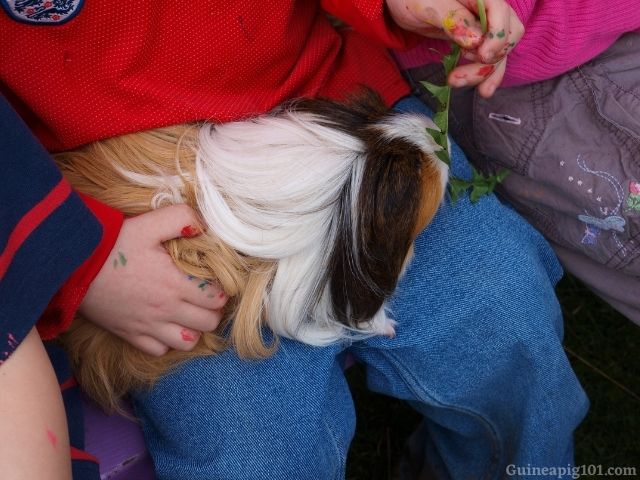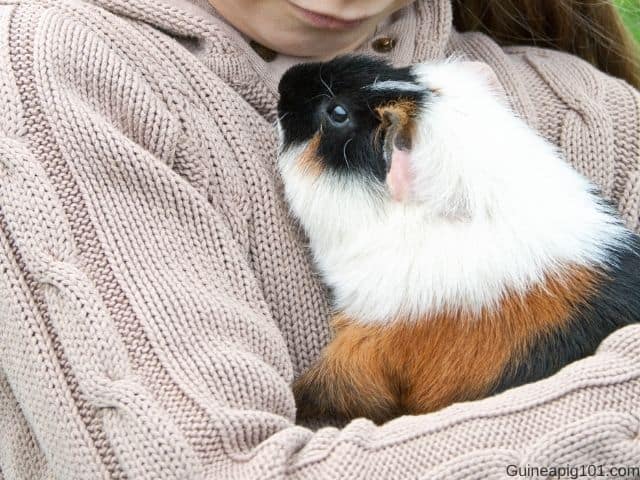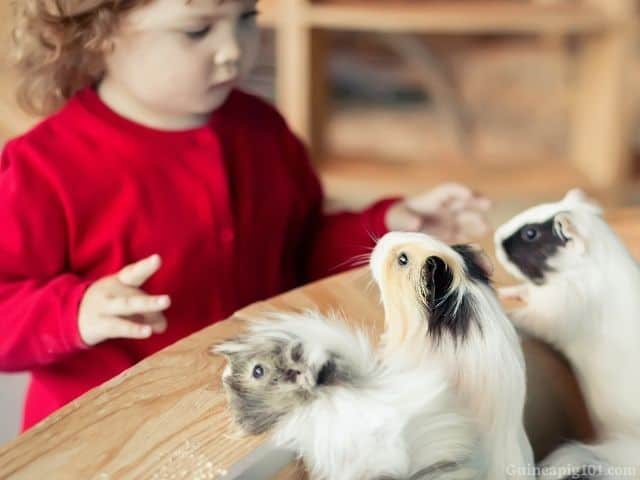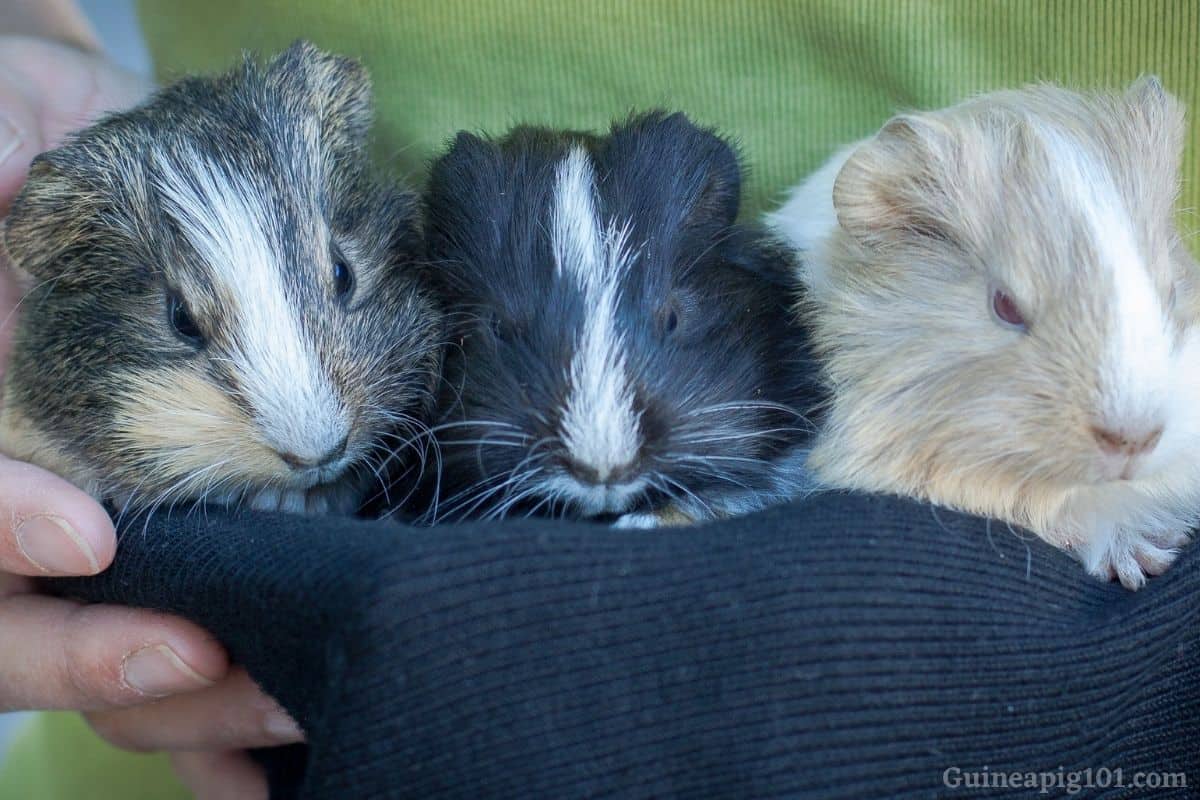Guinea pigs are those furry little pets that are quite far from mainstream pets yet so popular among the people you can find in most American homes. But do you know how these pets became so popular? What are the pros and cons of guinea pigs? Let’s find out.
Pros of guinea pigs:
- Guinea pigs have a High life expectancy
- Guinea pigs make the great family pet
- Guinea pigs are easy to take care of
- Guinea pigs are Hygienic
- Guinea pigs have a Sweet and Docile Personality
- Guinea pigs love to be cuddled and petted
- Guinea pigs are easy to tame
- Guinea pigs are fun to have around
- Lots of breed and color to choose from
Cons of guinea pigs:
- Some people are allergic to guinea pigs
- Guinea pigs make loud Noises sometimes
- Some guinea pigs have a shy nature
- Guinea pigs need a company
- Maintenance cost for guinea pigs adds up pretty fast
- Guinea pigs grow fast and big
- Guinea pigs do require daily cleaning and interaction
- Someone needs to take care of them when you are in a Holiday
- We need to keep them indoors in winters
- Guinea pigs Need a big cage or runner or open space
Now, let us learn about each pros and cons in detail. But first, let us learn some facts about guinea pigs.
Guinea pig basic information
Guinea pigs previously originated from the Andes Mountain of South America, which is present, is alluded to as the southern piece of Colombia, Ecuador, Peru, and Bolivia. It is likewise said that they have been tamed for a great many years prior. What we see today is changed over 1000’s years.
Around the end of the sixteenth century, guinea pigs were first conveyed to Europe in the era of Queen Elizabeth, where they rapidly ended up well known among the Upper class and Royal family as Exotic pets.
Later down the line, it turned into a typical pet among all. Today, they stand out amongst the most cherished and kept pets in America, Australia, and some different world pieces.
So, let us now learn what are the pros of guinea pigs.
Pros of owning Guinea pigs:
Like any other pets, guinea pigs have pros and cons, but guinea pigs have something special in them, which makes them stand out from the crowd and make them one of the most common pests in the U.S and U.K. Let us start by learning about the benefits of owning a guinea pig.
Guinea pigs have High life expectancy
Guinea pigs have a decent life expectancy when compared to similar pets. While a hamster only lives for 2-3 years, a Guinea pig can live up to 5-7 years if properly taken care of.
Some guinea pigs have been recorded to live over a decade also. They are a great companion pet as they tend to live longer than other small pets.
But with higher life expectancy, there comes a sense of responsibility. As guinea pigs are totally dependent upon their owners for their well-being, someone always needs to be there with them to take care of them.
You cannot leave your guinea pig for a week-long vacation and go. Without fresh food and clean water, they might not make it until you return from vacation.
However, guinea pigs’ life expectancy depends upon how we take care of them, Which breed of guinea pig you are keeping, their diet, and so on.
So, in a nutshell, their long life is a great thing, but if you cannot dedicate the time for them, you must consider getting some other pets.
You can learn more about Guinea pig’s lifespan in our detailed guide.
Guinea pigs make the great family pet

Guinea pigs make a great family pet. They are a great choice of pet for elementary school children as well. These pets will keep your children busy and away from television and mobile phones as they require 3-4 hour floor time.
Guinea pigs also teach your children a sense of responsibility. They make a great pet for children because they live longer than the hamster and other small pets and are not so fragile as rabbits.
Your children will enjoy watching your guinea pig as they are very energetic and curious. Often they will borrow and hide around the cage and pop up amusing us. They will also run around the entire room and circle every corner if left on the floor.
Note: Keep children under adult supervision when they are handling the pet. Leaving them alone can be harmful to either one of them.
Guinea pigs are easy to take care of
As long as you feed your guinea pigs properly and take proper care of them, they won’t get ill that easily. Guinea pigs have a vegan diet that is easy to take care of and often produces less smell than dogs and cats.
In a stable environment, guinea pigs are very less susceptible to diseases. This makes them a hardy pet for our home. Guinea pigs also don’t require any special dietary supplements or medication than other mainstream pets like dogs.
The dietary needs of a guinea pig are straightforward. Most of their diet is hay, which is around 80%. While 10-15% of their diet contains fresh vegetables or pellets, only 5% of their diet contains treats and fresh fruit. Except for this, you will need to give them a freshwater source, and you are done.
You can learn more about their diet on our A-Z complete guide on Guinea pig diet
Note: Guinea pigs do require fresh food and water daily. Also, they must have access to fresh hay all the time.
Guinea pigs are Hygienic
Guinea pigs are as clean as you keep them.
They like to keep themselves clean. If you maintain the guinea pig cage properly and keep their living area clean, then you will not have to bathe the guinea pig regularly. Guinea pigs need a bath every 5-6 months or so.
If you can maintain a clean environment, then there will be no smell or as such. Many people will complain about their guinea pig smelling.
This is the cause of non-maintenance of proper living conditions. If your guinea pigs walk and live in a cage full of poop, it will obviously stink in a few days.
Guinea pigs like to groom themselves all the time. If you watch closely, you will often notice guinea pig using a white grease-like substance, which they secrete from their corner of the eyes to groom their fur. This often keeps the fur smooth and clean.
Guinea pigs have a Sweet and Docile Personality
If you keep your guinea pig healthy and care for them properly, then it can be one of the most rewarded pets in the hobby. Guinea pigs are often known for their personality.
Guinea pigs are social animals who love to live in a group. They are more like community pets, which you can keep in a group and expect nothing to go wrong until you care for them properly.
They have a calm and docile personality. Most of them like to live peacefully, but there are a few exceptions always.
Guinea pigs are also very interactive with their owners. Often, when I get back from work, I find the piggies standing by the cage popcorning and waiting to be fed by me.
They make sure to greet you with enthusiasm when you get around them.
Guinea pigs love to be cuddled and petted
If you have owned a bird-like Cockatiel, hamster, or rabbit, you might have noticed that they don’t like to be petted or cuddled much. Often you will get scratched or bitten when you try to do so. But with guinea pigs, the story is completely different.

Guinea pigs love to be cuddled and petted until and unless you are gentle with them. You will rarely experience resistance or get bitten by them when you try to do so.
They love to play around in the room and will enjoy the company of other guinea pigs, as well as you.
Guinea pigs are mostly calm, but sometimes a few males get territorial and aggressive. But there is nothing much to worry about, you can keep them separated for half an hour or so, and they will calm down.
They are also quick learners and will learn that it’s a negative reinforcement for aggressiveness to improve in that aspect.
Guinea pigs are easy to tame
Guinea pigs might look small, but they are quite intelligent. They can be trained much like a dog if we do it correctly.
When we first get a guinea pig, they might be nervous and skittish, but over time, with our gentle care and guidance, they will follow along and get tamed very easily.
In no time, you will find your guinea pig roaming around behind you just like a dog if we care for them and tame them properly.
Just by spending some time with your guinea pig and taming them properly, you can teach them a trick or two.
Guinea pigs are fun to have around
Guinea pigs are a great pet to be around. They will keep you amused for hours when you play with them.
Even in the cage, they love to hide, sneak out from one place to an other, and are always doing something crazy.
They will often pull the food or treat, take it to their hiding, and chomp on it.
There cannot be another moment like your guinea pig popcorning for their favorite treat when they know you are getting one for them.
Lots of breed and color to choose from
Guinea pigs are available in lots of breeds and types. Right from a skinny pig to a short-haired one followed up with a wide variety of long-haired ones, there are lots of options and choices to make when it comes to choosing the right one for yourself.
Usually, the short-haired breed like American guinea pigs or Abyssinian guinea pigs is chosen by beginners as they are a great pet to start with.
Long-haired guinea pigs are great too, just like Peruvian guinea pigs, but they require proper grooming to keep their hair maintained, making it difficult for a beginner.
Right from Pure white Himalayan guinea pig to white-crested single color guinea pig followed by a red/black patterned Abyssinian guinea pigs, there are lots of colors to choose from.
I would dare say that there is something for everyone regarding guinea pigs breed and colors.
Cons of Guinea pigs:
Two sides of the same coin.
Owning a is a rewarding experience for some people, while it can be daunting to others. Just like every coin has two sides, there are two sides to owning a guinea pig also. We have seen the good side already. Now I would like to share a few cons or uncertainty which comes with guinea pigs.
Allergic to guinea pigs
Although guinea pigs are not hypoallergenic there can be some people who are allergic to them.
We can simply say that any pet with fur, hair, or feather is capable of causing an allergic reaction to some human beings. It can be any animal like dogs, cats, birds, guinea pigs, etc.
The allergy to guinea pigs is one of the major cons of owning a guinea pig.
The protein present actually causes the allergy in animal saliva or urine. Often time the allergens get transmitted when we play around our pet, cuddle them or touch them.
Some people are also allergic to the hay or grass dust we serve to our guinea pigs. However, this is not a serious problem that can’t be dealt with.
We can choose to serve high-quality hay, which usually has little to no dust in it.
Guinea pigs make loud Noises
Although Guinea pigs have a calm and docile personality, sometimes they do make out loud noises. They look like a quiet pet, but that isn’t always the case.
You will hear guinea pigs whistling, chirping, purring, or hissing. These sounds are a great sign of what the guinea pigs want to express.
If the guinea pigs are hungry and excited about the food, they might whistle. While the other time they are angry or in fear, then you will hear them purring and hissing.
Although these sounds are not so loud all the time. Sometimes they do have a high pitch, and this cannot be very pleasant to some people.
Shy nature in some guinea pigs
Guinea pigs are a great family pet. They enjoy being social and being accompanied by their owners, but some guinea pigs are shy at first.
This can be because they are getting adjusted to the new environment when you first get them.
You will need to take each step very slowly when approaching a new guinea pig. They are not going to be so friendly and playful right from the first.
Usually, guinea pigs have a very shy personality in a new environment. They might hide in the hiding spot and not even peek out for some time.
The key here is to let them get settled in the environment, and then there are many things we can do to help them be more open and playful around us.
Also Read: How long do guinea pigs take to settle in? (help my guinea pigs to settle in)
Guinea pigs do need a company
Guinea pigs are social animals and sometimes people think it is quite fine to have only a single guinea pig.
Yes, you might have a lot of time to give to your pet and they might enjoy around you but again there will be no one they can communicate in their vocal language.

An animal law introduced in 2008 in Switzerland states keeping a single guinea pig is a crime out there.
It is very tough for an owner who has some work in the office or kids with schools and colleges to provide ample time to their guinea pigs.
So it is best if they are kept in a group of 2 or more. The more, the merrier it is when it comes to guinea pigs.
Maintenance cost for guinea pigs adds up pretty fast
Although guinea pigs are a meager cost to start with compared to other pets, they can get quite expensive in the long run.
If you do not take proper care of your pig or unhealthy, they do require regular vet visits, which are quite costly in the long run.
Although the regular hay for guinea pigs is quite cheap, vegetables in winter cost a fortune in some places.
Even if you are not eating many veggies as the prices are too high, guinea pigs need veggies in some quantity as part of their diet. Without adequate vegetables in their diet, they will suffer from vitamin deficiency.
So, sometimes guinea pig’s costs of maintenance do add up pretty fast.
Guinea pigs grow fast and big
Guinea pigs might look like a small animal when they are pretty young, but they can grow pretty fast and pretty big in just a few year’s time frames.
It might be tough for a beginner to understand how much they grow and their size later. This makes the choices for cages and stuff wrong for sure.
At the time of birth, the guinea pigs are often only a few inches. Anywhere between 1-3 inches.
But just in a time frame of 8 weeks, they can grow up to 8 inches, and by the end of 14 weeks, they are sure to be around 10 inches. Thus we must understand the right size they will be after they mature.
Some people often think of them as small pets and get them home, not realizing how big they can get.
So, they abandon them later or cannot provide them with an adequate size cage later. So, it is best if you consider this first.
Cleaning and interaction
Guinea pigs are really hygienic and social pets. They love to keep themselves clean as well as they love the interaction with their owners.
Although guinea pigs love to stay clean, there is a big role of their owner also in keeping them clean and not smelly.
See, our guinea pigs live in a confined area, a cage where there is no big room, so they will run over their litter if we do not spot clean the cage every day.
Cleaning the cage every day and changing their bedding once a week is essential to prevent our guinea pigs from smelling and for their good health.
You can learn more about Guinea Pig Smells and How To Keep A Guinea Pig Cage From Smelling? in our article.
Also, guinea pigs do require a lot of interaction and playtime. If you cannot give at least 2 hours of playtime to your guinea pig, their body might not get the exercise they need, leading to obesity and ill health.
Holiday time
Guinea pigs require daily care, right from their cage cleaning to providing them with fresh hay, vegetables, and water.
If you are a frequent traveler, then guinea pigs might not be a great choice for you.
Either it would be best if you take your guinea pigs for a holiday with you, or you will need someone back in your place to look after them.
Now, that someone might be a family member, a friend, or acquaintance.
Do make sure they are responsible enough for the task. You might also take your guinea pig to nearby daycare, who charges a good amount to take care of your pet when you are not around.
Keep indoor in winters
Guinea pigs need a good and stable environment to live. Although they are hardy, they are prone to diseases caused by temperature fluctuations.
Guinea pigs do not have sweat glands like us to maintain their body temperature, and they are totally dependent on us for the same.
If you live in an area where the temperature drops significantly during winter or you see heavy snowfall in that season, you might need to get them indoors for the winters.
Guinea pigs cannot live in either too hot environment or too cold ones. They need a balanced, stable environment to live a healthy life.
Guinea pigs Need a big cage or runner or open space
Guinea pigs surely need a big cage to live in. Although they might look like a small pet to you when you first get them, they surely will grow and become big over time.
Often time people get a cage suitable for a hamster for their guinea pigs. This might not be the thing you are looking forward to.
Guinea pigs do need a large cage so that they live a happy and healthy life. A minimum cage size of 2 feet by 3-4 feet is ideal for a pair of guinea pigs.
But surely, the cage is not the place you want your guinea pigs to be all the time. Guinea pigs do need some time to run, play around, and exercise.
This helps them keep themselves fit. So, if you don’t have enough time to take them out, you will also need a runner to exercise and play around.
The conclusion to the pros and cons of Guinea pigs
Like any other animal, there are pros and cons of guinea pigs as well. But what I see is the pros very much outranks the cons overtime.
If you are a pet lover and you care for your pets, then the cons of owning a guinea pig are really nothing when compared to the pros of owning them.
Whatever you do, If you are looking to get them home for the first time, look into all of the pros and cons of guinea pigs and consider each one properly.
Many owners get a guinea pig but do not take care of them properly, so as a result, they either die too soon or end up at a rescue center.
Sources: Nutrient Requirements of the Guinea Pig, The effects of diet on guinea pigs, Guinea Pig Diet, Patterns of feeding in the Guinea pig. Sciencedirect, The prenatal growth of the guinea‐pig, Use of cage space by guineapigs, Guidelines for the Housing of Guinea Pigs, Housing Guinea pig colony, Guinea pigs housing
